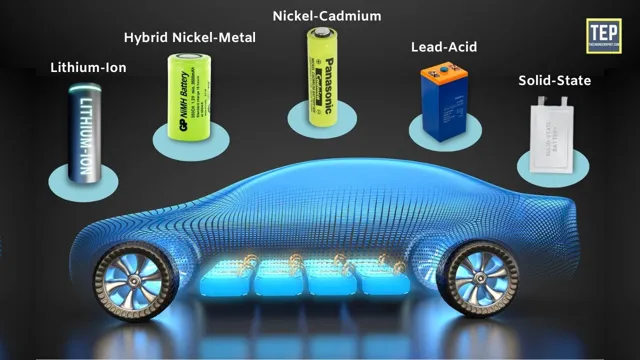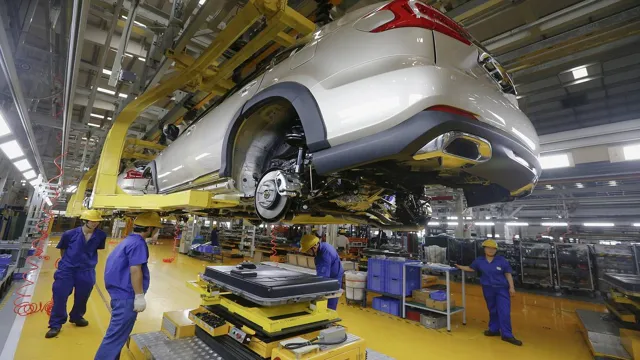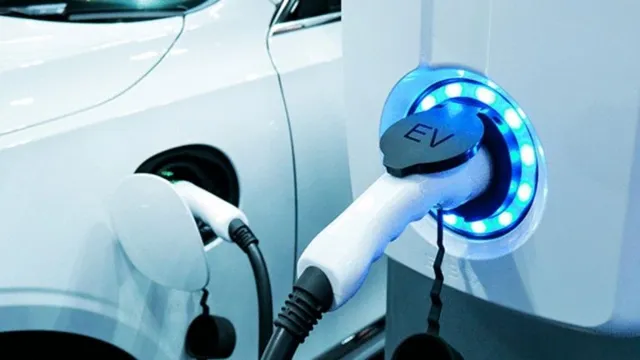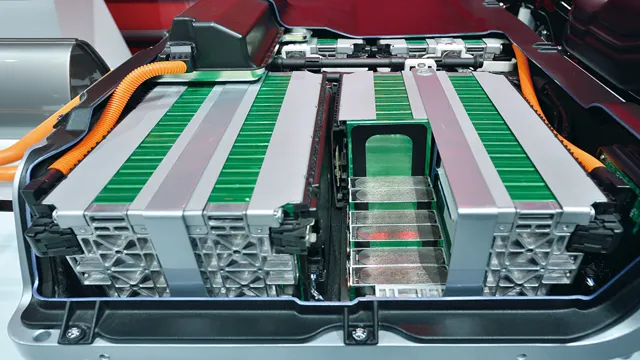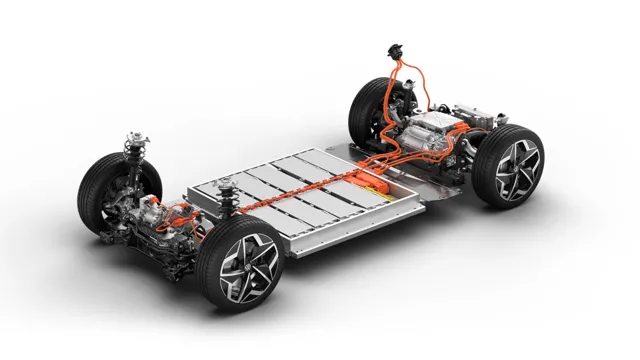The Power Behind Electric Cars: Understanding the Battery Types Used for Optimal Performance
Electric cars are becoming increasingly popular as people become more environmentally conscious. However, have you ever thought about what is inside the electric car batteries? They are a crucial component that powers the vehicle and allows it to run without emitting harmful pollutants into the air. In this blog post, we will dive into the fascinating world of electric car batteries, looking at what they are made of, how they work, and why they are such an important part of the move towards a greener future.
So, settle in and let’s explore together what lies inside these powerful energy sources.
Introduction
Electric cars have been gaining a lot of popularity over the years, primarily due to their eco-friendliness and cost savings. One of the most critical components of electric cars is their batteries. The battery type used in electric cars is typically a lithium-ion battery, which is lighter, more energy-dense, and longer-lasting than traditional lead-acid batteries.
These batteries are capable of holding a lot of charge, making them ideal for electric vehicles. Lithium-ion batteries are also rechargeable, which means that they can be used repeatedly before needing to be replaced. The energy density of these batteries continues to improve, making them more reliable and efficient.
They are also less toxic than other types of batteries, making them an environmentally friendly option. In summary, the lithium-ion battery is the most commonly used battery type in electric cars that provides a high level of efficiency and environmental friendliness while being light and long-lasting.
Why Battery Type Matters
When it comes to choosing the right battery for your device, many factors come into play. One of the most crucial factors is the type of battery you select. There are various types of batteries available in the market, and each one has its unique characteristics and features.
The battery type is a critical part of any device that has a battery. It’s essential to understand how the battery works and what kind of power it can provide to ensure optimal performance. Choosing the right battery type can mean the difference between a device that works efficiently and one that runs out of power quickly.
Therefore, it is essential to consider battery type before purchasing any device and ensure it’s suitable for your needs.

Types of Electric Car Batteries
The battery type used in electric cars can significantly impact on the vehicle’s performance and driving range. The most commonly used battery types in electric cars are lithium-ion batteries, nickel-metal hydride batteries, and lead-acid batteries. Lithium-ion batteries are the most advanced and widely used batteries for electric cars.
They offer high energy density, which means they have a high storage capacity and can provide a longer driving range for the vehicle. Nickel-metal hydride batteries are older battery technology but are still in use for some electric cars. They offer a lower energy density than lithium-ion batteries but are cheaper and safer.
Lead-acid batteries are the least expensive and the least efficient type of battery used in electric cars. They’re commonly used in low-speed electric vehicles like golf carts and small electric trucks. However, they’re not suitable for high-speed electric cars due to their limited range and low power output.
In conclusion, the type of battery used in electric cars significantly influences the vehicle’s overall performance, range, and cost.
Lithium-Ion Batteries
Lithium-Ion Batteries Electric cars are becoming increasingly popular due to their low environmental impact, lower operating costs and potentially cheaper maintenance costs. The key component of an electric car is the battery, which stores the energy required to run the motor. There are several different types of batteries that can be used in an electric car, but the most common is the lithium-ion battery.
This type of battery is widely used in consumer electronics and has been adapted for use in electric cars. Lithium-ion batteries are known for their high energy density, which means they can store more energy per unit weight than other types of batteries. They are also known for their long cycle life, which means they can be charged and discharged many times without losing capacity.
Additionally, they have a low self-discharge rate, which means they can retain their charge for a long time when not in use. However, lithium-ion batteries also have some drawbacks, such as being difficult to recycle, and having a tendency to catch on fire if they are damaged. Despite these drawbacks, lithium-ion batteries are currently the most popular choice for electric cars due to their high energy density and long cycle life.
Nickel-Metal Hydride Batteries
Electric car batteries come in different types, including nickel-metal hydride batteries, which are an improvement over earlier nickel-cadmium batteries. These batteries are more environmentally friendly and have a higher energy density, meaning they can store more energy in a smaller space. However, they are not as efficient as lithium-ion batteries, which are commonly used in electric cars due to their high energy and power density.
Nickel-metal hydride batteries are still used in some hybrid cars because they are reliable and last longer than their lithium-ion counterparts. Although they are bulkier and heavier, these batteries are less sensitive to temperature changes and can withstand more charging cycles than other batteries. They are a great option for drivers who prioritize reliability and longevity over efficiency and performance.
Solid-State Batteries
Solid-state batteries are a potential game-changer for the electric car industry. They are a type of battery that replaces the liquid electrolyte found in traditional lithium-ion batteries with a solid electrolyte. Solid-state batteries have the potential to be much safer than lithium-ion batteries because they are less prone to overheating and catching fire.
They also have higher energy density, which means they can store more energy in the same amount of space. Although solid-state batteries are still in the development phase, many researchers believe that they could be the future of electric car batteries. With the potential to revolutionize the industry, solid-state batteries could lead to longer-range electric cars, faster charging times, and ultimately, a cleaner environment.
Battery Performance Factors
The type of battery used in electric cars is an essential factor that affects the overall vehicle performance. Lithium-ion batteries are the most commonly used type of battery in electric cars due to their high energy density and efficient charging capabilities. However, other battery technologies, such as lead-acid and nickel-metal hydride, are also used in some electric car models.
Battery performance is affected by several factors, including the battery type, the size of the battery pack, driving conditions, temperature, and the age of the battery. These factors can impact the range, charging time, and overall lifespan of the battery. As the electric car industry continues to grow, battery technology advancements are being made to improve performance, reduce costs, and increase the range of electric vehicles to compete with traditional gas-powered cars.
Energy Density
Energy Density When it comes to battery performance, energy density is a crucial factor to consider. Essentially, energy density refers to how much energy a battery can store per unit of its volume or mass. A higher energy density means that a battery can store more energy in a smaller space or weight, making it more efficient.
This is why lithium-ion batteries are commonly used in electric cars and smartphones—they have a high energy density. However, there are trade-offs when it comes to energy density. High-density batteries tend to have shorter lifespans and can often be more expensive to produce.
It’s important to find a balance between energy density and other factors, such as cost and safety, when choosing the right battery for a particular application.
Cycle Life
When it comes to the cycle life of batteries, there are various factors that determine their overall performance. One of the most significant of these factors is the depth of discharge (DOD) of the battery. The deeper the discharge, the lower the overall cycle life of the battery.
This is because a deeper discharge puts a more significant strain on the battery, causing it to degrade faster over time. Other factors that impact battery cycle life include the charging rate, operating temperature, and age. A battery that is charged at a rapid rate or subjected to extreme temperatures may also have a lower overall cycle life.
It is essential to consider all of these factors when selecting a battery and understanding how they impact its longevity. By selecting a battery with a longer cycle life, you can ensure that it performs optimally for a more extended period, ultimately saving you time and money on future replacements.
Charging Time
When it comes to battery performance, charging time is a crucial factor to consider. The length of time it takes for your device to recharge can greatly impact its overall usability. The amount of time it takes to charge your device will depend on various factors, including battery size, charging speed, and the type of charger you use.
For example, a larger battery will generally take longer to charge than a smaller one. Additionally, using a fast charger can significantly reduce charging time, but it may also generate more heat and reduce overall battery life in the long run. Some devices also come with specialized chargers that can provide optimal charging speeds, while others may require a specific type of charger for optimal performance.
It’s important to keep in mind that charging time is just one aspect of battery performance, and other factors such as battery life, capacity, and overall efficiency can also impact the usability of your device. By understanding how all of these factors work together, you can make informed decisions when it comes to battery usage and get the most out of your devices.
Future of Electric Car Batteries
When it comes to the future of electric cars, battery technology is a crucial component. So, what kind of battery type is used in electric cars? Currently, the most common type of battery used in electric cars is lithium-ion. However, there are also advancements being made in solid state batteries, which have the potential to provide higher energy density and safety.
The focus is on improving battery performance, including range, charging time, and durability, while also reducing costs. The goal is to make electric cars more accessible and affordable for the general public. With continued research and development, the future of electric car batteries looks promising, offering a sustainable and environmentally friendly alternative to traditional gasoline-powered cars.
Conclusion
In conclusion, when it comes to batteries used in electric cars, there’s no one-size-fits-all approach. It’s a balancing act between factors such as cost, weight, range, and recharge time. It’s like choosing the perfect pair of shoes for a marathon: you want something that’s reliable, comfortable, and will last the distance.
As technology advances and more options become available, one thing is for certain: electric cars are becoming increasingly popular, and the type of battery used is just as important as the car itself. So, whether you opt for a lithium-ion, nickel-metal hydride, or something altogether different, just remember that the battery is the heart of your electric car – so make sure it’s a good one!
FAQs
What type of battery is used in electric cars?
Most electric cars use lithium-ion batteries, which provide high energy density and a longer lifespan than other types of batteries.
How long do electric car batteries typically last?
The lifespan of an electric car battery depends on several factors, but most manufacturers offer warranties of around 8 years or 100,000 miles.
Can the battery in an electric car be replaced?
Yes, the battery in an electric car can be replaced. However, the cost of a replacement battery can be significant, so it’s important to factor this into the overall cost of ownership.
How long does it take to charge an electric car battery?
The time it takes to charge an electric car battery depends on several factors, including the capacity of the battery, the charging speed of the charging station, and the type of charger used. On average, it takes around 30 minutes to charge an electric car to 80% capacity at a fast charging station.
